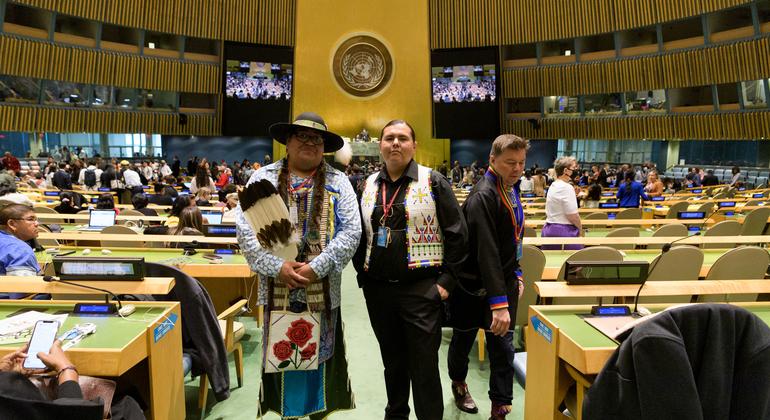Gathered in the UN General Assembly Hall for the first time in three years, indigenous representatives were welcomed in a traditional ceremony led by Katsenhaienton Lazare of the Bear Clan, Mohawk of the Haudenosaunee, who acknowledged nature in its great diversity – the winds, thunders, lightening, sun and other life forces – which give purpose and protection to humankind, and summoned generations of traditional ancestors who still have much to offer today’s societies.
The invocation dovetailed with the theme of the Forum’s twenty-first session – ‘Indigenous peoples, business, autonomy and the human rights principles of due diligence including free, prior and informed consent’ – and start of the International Decade of Indigenous Languages, 2022-2032.
An infinity of sacred histories
In opening remarks, Chair Darío José Mejía Montalvo of Colombia said the 2022 theme touches upon the cosmos visions through which indigenous peoples have developed their systems for food, culture and coexistence with nature on their territories.
“We share a holistic relationship with nature, where rights are not anthropocentric,” he explained. “An infinity of sacred histories and stories underpin our visions of the world.”
Ancestors too have rights – including to exist – because their task is enduring in the preservation of life. These ancestral practices maintain life in all its forms, with dignity.
Therefore, he said the question of whether indigenous knowledge is scientific is “meaningless”: concepts of life, energy and spirituality are synonymous. Separating them from an economic, religious or other point of view leads to confusion, disputes and unnecessary clashes.
Trampling over informed consent
He said that while indigenous peoples’ rights to self-determination, land, resources and – importantly – free, prior and informed consent are guaranteed under international norms, these rights are often not applied, even in countries where they are legally recognized. They are instead violated routinely in the granting of lumber, timber, mining and mega-dam contracts.
The pillaging of their resources, loss of their ways of life, cultures and languages, and the disappearing and killing of their leaders are the results of harmful business activities.
A binding treaty for business
Mr. Mejía Montalvo said that without a change to the current energy matrix, the extermination of indigenous peoples will continue, along with expropriation of their lands and the sweeping aside of their rights.
He pressed States to help devise a legally binding instrument to regulate transnational business activities – one that adheres to international human rights and includes explicit provisions for indigenous peoples’ rights to their lands, territory and resources, and for their free, prior and informed consent on decisions affecting them.
He described the Declaration on the Rights of Indigenous Peoples and International Labour Organization (ILO) Convention No. 169 as “fundamental loadstars” in this regard, and warned that industries from fashion and media to textiles, food and pharmaceutical production, are perpetuating “enclave economy models” that expropriate knowledge and practices from indigenous peoples. “All of these efforts must be interlinked and stepped up,” he said.
Traditional models lead the way
UN General Assembly President Abdulla Shahid said that for generations, indigenous communities have prioritized a relationship with nature – grounded in kinship, centered around reciprocity and infused with reverence. “By emulating their example on a broader scale, we can preserve the Earth’s rich biodiversity and diverse landscapes.”
He pointed out that indigenous people comprise less than five per cent of the global population yet protect 80 per cent of global biodiversity, stressing that high linguistic diversity occurs where conditions for biological diversity thrive. “It’s the richness of one that sustains the other,” he explained.
Mr. Shahid said there is growing scientific evidence that indigenous languages that are rich in oral traditions offer evidence for events that happened thousands of years ago.
“By preserving and promoting these languages, we preserve and promote an important part of our human heritage, identity and belonging,” he said. “We have an obligation to ensure that they can participate in and benefit from the work of the United Nations.”
Also addressing participants, UN Economic and Social Council President Collen Vixen Kelapile said the Forum’s expert advice – as an advisory body to the Council – is crucial to highlighting the key issues affecting indigenous peoples.
He said the High-Level Political Forum on Sustainable Development– to be held in July and feature the national reviews of 45 Member States – will offer a significant opportunity for indigenous peoples to showcase their traditional knowledge on biodiversity, climate change and environmental stewardship.
Mr. Kelapile urged Member States to seek their participation, adding: “I look forward to your recommendations which should be built into the Council’s different platforms”.
Manage the most, own the least
UN Under-Secretary-General for Economic and Social Affairs Liu Zhenmin – in a message delivered by Assistant Secretary-General for Policy Coordination and Inter-Agency Affairs Maria-Francesca Spatolisano – stressed that indigenous peoples customarily claim and manage more than 50 per cent of the world’s land, yet only legally own 10 per cent of it.
As a result, 40 per cent of the land surface – five billion hectares – remain vulnerable to land grabbing and environmental destruction. When indigenous communities resist these actions, they often face extreme reprisals.
A pledge to do better
He cited a 2020 analysis revealing that 331 human rights defenders were killed – 26 per cent of them while defending indigenous people’s rights – describing these figures as “startling”. UN entities are working together to improve their response, he said, strengthening their engagement with country teams and seeking ways to enhance indigenous people’s participation in the Organization’s processes.




